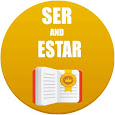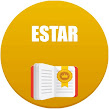In this lesson you are going to
learn the difference between ser and estar in Spanish.
Ser and estar can both be translated as “to be”
In Spanish, a different verb is used to express “to be” depending on whether the speaker intends to address a condition or an essential quality.
Subject – Estar – Ser (to be)
Yo (I) – estoy – soy
Tú (You)(Informal) – estás – eres
Usted (You)(Formal) – está – es
Él/Ella(He/She) – está – es
Nosotros(as)(We) – estamos – somos
Vosotros(as)(You)(Informal) – estáis – sois
Ustedes(You)(Formal) – están – son
Ellos(as)(They) – están – son
When to Use Estar in Spanish?
Estar (To Be)
Notes:
1- To address condition, use “estar”. “Estar” is an irregular verb.
e.g.
El plátano está verde – The banana is green (condition)
La sopa está caliente – The soup is hot (condition)
Ella está enferma – She is sick (condition)
2- If you are talking about how something is, use “estar”
e.g.
Question: ¿Cómo está él? – How is he?
Answer: Él está enojado – He is mad
Note: “Estar” is used to express geographic or physical locations.
e.g.
Question: ¿Dónde estás? – Where are you?
Answer: Estoy en el trabajo.- I’m at work
Question:¿Dónde está mi llave? – Where’s my key?
Answer: La llave está en tu cuarto – The key is in your bedroom
Tip: The one exception to this rule is that “ser” is used to tell where an event is taking place. (La fiesta es en mi casa. – The party is at my house)
Note: “Estar” is used with adjectives to express a state or condition (“how” something is).
Question:¿Cómo está el agua? – How’s the water?
Answer: El agua está fría. – The water is cold.
Question:¿Cómo estás tú? – How are you?
Answer: Estoy muy bien, gracias.- I am very well, thanks.
Note: “Estar” is used with many idiomatic expressions.
estar de acuerdo- to be in agreement
estar de pie- to be standing
estar en camino- to be on the way
estar en las nubes – to be daydream
Note: “Estar” is used with the Progressive Tenses
Question:¿Qué estás haciendo? – What are you doing?
Answer: Estoy estudiando Español – I am studying Spanish
When to Use Ser in Spanish?
Ser (To Be)
Notes:
1- To address an essential quality, use “ser”. “Ser” is also irregular.
e.g.
El plátano es verde – The banana is green (quality)
El colchón es suave – The mattress is soft (quality)
2- If you are talking about what something is, use “ser”.
e.g.
Question: ¿Qué es ella? -What is she?
Answer: Ella es una profesora – She is a teacher
Note: “Ser” is used to express the hour, day, and date.
e.g.
Question: ¿Qué hora es? – What time is it?
Answer: Son las dos. – It’s two o’clock.
Question: ¿Qué dia es hoy? – What day is today?
Answer: Hoy es Martes. – Today’s Tuesday.
Question: ¿Cuál es la fecha de hoy?- What’s today’s date?
Answer: Es el treinta de mayo.- It’s May 30.
Note: “Ser” is used to express place of origin.
e.g.
Question: ¿De dónde eres tú? – Where are you from?
Answer: Soy de Colombia. – I’m from Colombia.
Note: “Ser” is used to express occupation.
Question: ¿Cuál es tu trabajo? – What is your job?
Answer: Soy ingeniero – I’m an engineer
Note: “Ser” is used to express nationality.
Question: ¿Es ella cubana? – Is she Cuban?
Answer: Sí, ella es cubana – Yes, she’s Cuban.
Note: “Ser” is used to express religious or political affiliation.
Ellos son comunistas – They are communists
Es el gobierno Socialista – It’s the Socialist government
Nosotros somos cristianos – We are christians
El sistema es Capitalista – The system is Capitalist
Note: “Ser” is used to express the material something is made of.
Eso es de cemento – That is (made of) cement
Las mesas son de madera – The tables are (made of) wood
Note: “Ser” is used to express possession.
Question: ¿De quién es el libro?- Whose book is it?
Answer: Es de Carlos – It’s Carlos’s
Note: “Ser” is used to express the relationship of one person to another.
Question:¿Quién es ella? – Who is she?
Answer: Ella es la esposa de mi tío – She is my uncle’s wife
Note: “Ser” is used with certain impersonal expressions.
Es necesario que llegue temprano – It is necessary to arrive early
Es importante que practiques a diario – It is important that you practice daily
Note: “Ser” is used to tell where and when an event is taking place.
El cumpleaños es el sábado – The birthday is Saturday
El evento es el lunes en el teatro – The event is Monday at the theater
La reunión es en el trabajo – The meeting is at work
.
Note: “Ser” is used with adjectives to express inherent, or essential qualities.
María es inteligente – Maria is smart
Ustedes son muy rápidos – You (all) are very fast
Popular Spanish categories to find more words and phrases:
A new category where you can find the top search words and phrases translated into English and Spanish. Be an expert in no time!
A new category where you can find the top search words and phrases translated into English and Spanish. Be an expert in no time!
This category has hundreds of words translated into Spanish and English. Just like a dictionary!
This category has hundreds of words translated into Spanish and English. Just like a dictionary!
In this Spanish category, you will find the translation of words and phrases in Spanish, with many sentences that will help you determine how each phrase or word is applied.
In this Spanish category, you will find the translation of words and phrases in Spanish, with many sentences that will help you determine how each phrase or word is applied.
Here are several infographics if you are looking to learn or teach the basic Spanish vocabulary for foreigners. Learn basic Spanish. Videos and resources to learn basic Spanish, Spanish for beginners.
Here are several infographics if you are looking to learn or teach the basic Spanish vocabulary for foreigners. Learn basic Spanish. Videos and resources to learn basic Spanish, Spanish for beginners.
The different verb tenses of Spanish are essential to understanding the language. Find out how to refer to the past, present, and future.
The different verb tenses of Spanish are essential to understanding the language. Find out how to refer to the past, present, and future.
Spanish to Go offers introductory courses you can take to learn Spanish online at your own pace. Whether you are learning Spanish to study or because you want to travel to a Spanish-speaking country. Find online courses to learn grammar, and basic Spanish.
Spanish to Go offers introductory courses you can take to learn Spanish online at your own pace. Whether you are learning Spanish to study or because you want to travel to a Spanish-speaking country. Find online courses to learn grammar, and basic Spanish.
Study Spanish grammar, learn the rules, and know-how and when to apply them.
Study Spanish grammar, learn the rules, and know-how and when to apply them.



Leave a Reply
You must be logged in to post a comment.